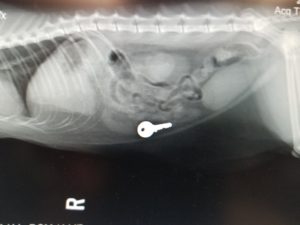Why does my dog eat grass?
Why does my dog eat grass?
Though it might sound strange, this is actually a question we hear all the time—second only to “Why does my dog eat poop?”
What could possibly compel a dog to chow down on grass when there’s a perfectly good (not to mention tasty) bowl of food inside
Unfortunately, the answer isn’t so simple. There are plenty of reasons why a dog might eat grass, sticks, rocks, and other outdoor dirt and debris.
Before we explore what some of those reasons might be, we first need to talk about pica.
Pica: What is it and why should I care?
Pica is the medical term for the consistent chewing and eating of non-nutritional items. This includes any item whose consumption doesn’t physically benefit an animal: grass, rocks, socks… whatever your dog decides to treat as food.
Thankfully, only a small percentage of dogs actually ingest the items they sneak. That doesn’t mean the experience isn’t frustrating and stressful for you, though.
Pica tends to present more in puppies than adult dogs and can be a sign of a medical or a behavioural issue. When certain items are ingested, they can wreak havoc on your dog’s insides. Poisoning, fractured teeth, and gastrointestinal tract blockages are just a few consequences of inappropriate consumption.
To be clear, if you’re wondering why your dog eats sticks and grass, the answer isn’t necessarily pica. We do recommend key-ping an eye out for any other unusual consumption behaviours, though, just to be safe.
Speaking of keys…

Even though we’re all about dogs at Waggle Mail, this foreign body case from one of our feline friends is too interesting not to share. If you’re here because you’re wondering, “Why does my dog eat grass?” or “Why does my dog eat rocks?” imagine these cat parents questioning why their beloved pet decided to play hide and seek with their gym locker key!
Reasons why dogs eat grass
Regardless of whether your dog receives a pica diagnosis, it’s important to understand what underlying reasons might be behind their lawn-eating behaviour. As you’ll see, these reasons range from behavioural to medical, and are all best discussed with your family vet.
- Nutritional deficiency
If your dog is experiencing a nutritional deficiency, they’re not taking in enough nutrients such as vitamins and minerals. Most dogs nowadays are eating well-balanced (and, ideally, vet-recommended) diets.
If you’re feeding your dog a raw or homemade diet, make sure you or the company you’re buying from has consulted a veterinary nutritionist; this helps ensures the food they eat has everything they need to thrive.
To be clear, kibble isn’t always the answer. Commercial diets that are poor quality, have nutrient excesses, or have incorrect supplements added can also cause a nutritional deficiency.
EXPERT TIP: If you’re buying food by the bag, look for an AAFCO nutritional adequacy statement that confirms a balanced diet. The Pet Nutrition Alliance also keeps a handy list of brands and manufacturers and whether they’ve consulted a nutritionist. The more you know!
Sometimes disease can lead to nutritional deficiency, as the body can’t properly take in available nutrients. Symptoms will vary based on the disease, but as a general rule watch for sudden increases in appetite, weight loss, vomiting, diarrhea, and other out-of-the-ordinary behaviours.
One nutrient that is thought to be linked to gnawing on grass is a lack of fibre. A fibre deficiency decreases your dog’s ability to digest food and pass stool, so grass may help get their gastrointestinal tract moving. Certain conditions require fibre supplementation; if you think this might be something affecting your dog, talk to your vet about trialling a high-fibre diet or sprinkling a fibre supplement like metamucil (our top pick) on top of your dog’s food.
2. Upset stomach
There is another theory that dogs eat grass to ease an upset stomach or to induce vomiting. However, it can be difficult to discern whether the upset stomach causes the grass eating or the grass eating causes the upset stomach.
Researchers have actually tested this theory and found that 10% of dogs showed signs of illness prior to eating grass, and 25% vomited after eating it. This means it’s unlikely that grass is a natural remedy for an upset tummy, but this can’t be totally discounted without further investigation.
If you think your dog is eating grass to soothe a sore stomach, or if you’re asking yourself “Why does my dog eat grass and throw up?” then it’s a good idea to give your vet a call.
3. Evolution
Although domestic dogs are not considered wolves, they are distant relatives.
Grass has been found in the stool samples of wolves; this could mean grass wormed its way in as a wolf was feasting on prey, or ingestion was intentional to meet a dietary need.
We also know that feral dogs scavenge, so dogs eating grass may be our pampered pets’ way of satisfying this natural instinct.
As unusual as it is to consider, dogs eating grass could technically be a normal behaviour we don’t yet fully understand.
4. Boredom
A dog without enough to do will usually find something to fill the time. Unfortunately, sometimes that “something” can be dangerous or disruptive, like inappropriate chewing or eating grass.
Toys and chews certainly help keep busy pups occupied, but for some dogs they require an extra dose of stimulation. Dog sports, obedience classes, or trick training are all great options to engage your dog in body and mind.
5. Stress and anxiety
EXPERT TIP: Especially in new situations and environments, some stress is normal—adaptive, even!
Eating non-food items can signal a stressed or anxious dog. A nervous pet may channel their anxious energy into less-than-desirable behaviours like eating grass or dirt, or desirable behaviours in excess like constantly lapping up water. These are what are called displacement behaviours, something that happens out of context when a dog is experiencing internal conflict.
For example, you might invite your dog to approach a new person, but instead they’re fixated on gobbling up grass and not at all concerned with interacting.
Although displacement behaviours may be associated with stress and anxiety, this isn’t always the case. Keeping a record will help you (and your veterinary care team) better understand what your dog might be going through.
Is eating grass bad for dogs?
Grass itself is not inherently harmful to dogs, but what’s on the grass may be.
Herbicides, pesticides, and fertilizers can be toxic to dogs. If you have sprayed or put down anything on your lawn, make sure to keep your dog at a distance until it’s safe for them to roam. Take care and take note of what you read on your product labels.
While eating grass, your dog might also ingest intestinal parasite eggs. Yuck. If your dog has a bad habit of eating grass, it’s important you take them for regular deworming. Hookworms and roundworms are common because they’re passed through dog feces. These feces can then contaminate the grass, with the eggs living on even after the poop has been scooped.
Ingesting other non-food items can be a little more risky. Any time your dog consumes a toxic substance, they are at risk of poisoning. There are also risks associated with object size, shape, and sharpness: a pointy object can puncture your dog’s mouth or their gastrointestinal tracts. An object that is not digestible (like a rubber ball, or rock for example) can cause a blockage in their guts, which requires foreign body surgery.
The rule of thumb to follow here is if you suspect your dog has eaten something they shouldn’t have, call or head straight to your nearest clinic. Your veterinary team may need to do diagnostic imaging (x-ray or ultrasound) to see what, if anything, is lurking inside.
How to stop a dog from eating grass
It’s not reasonable to keep your dog off the lawn forever, so what can you do to proactively address and prevent a dog from eating grass? Here are our top five tips to consider:
- Rule out nutritional deficiencies. Talk to your veterinarian to make sure this isn’t a concern.
- Give your dog space. If you’ve noticed an uptick in grass-eating behaviours, do your best to avoid grassy patches until you’ve sorted out the underlying issue. A basket muzzle might also do the trick: it prevents dogs from picking up and eating things they shouldn’t and might help smooth the transition.
- Address stress or anxiety. Start by sorting out what’s stressing your pet. If these behaviours only seem to happen when you’re not around, a video camera or baby monitor might reveal important information. Once you understand the root cause, you (with the support of your veterinarian or a trainer, as needed) can help them feel better. Your veterinarian may recommend an anti-anxiety medication to aid with training and ease anxiety.
- Offer plenty of enrichment and exercise. If you suspect your dog is eating grass because they’re bored, redirect with toys, chews, exercise, and adventure. Endorphins have an excellent calming effect (for you and your pet)!
- Consider counter-conditioning, training, and taste aversion. All of these involve training your dog to avoid eating whatever it is they are seeking out. By training commands like “leave it” and “drop it,” you can stop your dog in their tracks and remove whatever non-food item they’ve taken a shine to. Remember to reward them any time they leave that tasty item alone. Taste aversion can help curb the internal reward they get from eating a single item like plant dirt. Apply something like cayenne pepper, hot sauce, or a commercial chew deterrent to stop them from putting it in their mouth.
Hopefully these tips will help keep your grass green and your dog out of trouble.
Like what you read? Send this article to a friend and subscribe to Waggle (e)Mail. We love answering pet parent questions and demystifying all the funny, strange things our beloved dogs do.

